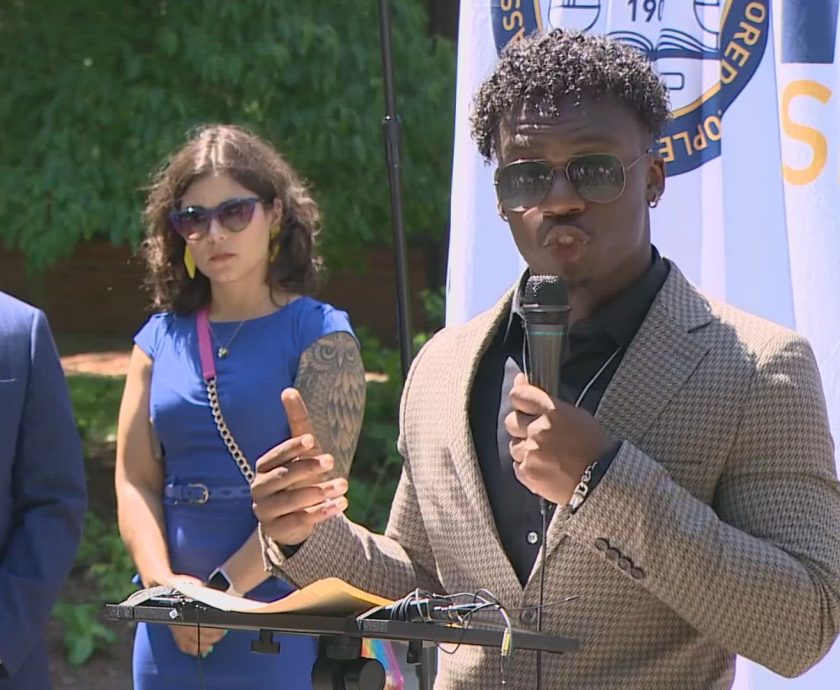A former North Seattle College (NSC) professor, Paul Kurose, says he is being targeted by Seattle Colleges District (SCD) administrators after he wrote an email pointing out a pattern of SCD not honoring due process for students and staff of color. His direct supervisor, Vice President of Instruction Peter Lortz, has since levied a claim against Kurose for targeting white administrators that is currently being investigated by SCD. The NAACP, the Japanese American Citizens League (JACL), and the Asian Pacific American Labor Alliance (APALA) are among those who have characterized Kurose’s treatment by Seattle Colleges as retaliation.

Meanwhile, NSC student Kai Silva awaits trial inside King County Correctional Facility (KCCF) after his suspension from NSC derailed his plans to transfer into the University of Washington’s Comparative History of Ideas program.
Kurose recalls joining Silva on the way to the school’s Equity and Welcome Center, where Silva was being recruited to become a paid greeter. Kurose’s brother, Guy, who died in 2002, had mentored Silva when Silva had been unhoused many years earlier, while still in high school. Now, Paul, a math professor at NSC and Seattle University, was mentoring 47-year-old Silva as he worked his way through the classes he had missed in high school.
After five years, Silva was on the cusp of getting his degree. Despite beginning community college “very, very behind,” Silva says he had built up his GPA to 3.1 and was accepted to UW’s Comparative History of Ideas program. At the same time, an article on the Seattle Colleges Foundation website highlighted how Silva, who is Black and Hawaiian, had spent periods of his life unhoused or incarcerated but that he “refused to let his past define him.”
Both men recall waiting about 15 minutes past the Equity and Welcome Center meeting’s start time before Christy Santos, former director of the Center, called them in. A few minutes into the meeting, they say Santos began speaking to Silva about the need for him to demonstrate “professionalism.” As Silva — who says he has been diagnosed with PTSD — recalls, he became triggered by Santos lecturing him on professionalism despite being late herself, and the conversation escalated. He ended up yelling at both Santos and Kurose before leaving the meeting. Silva spoke with Kurose the next morning and, Kurose confirms, Silva apologized to him.
Silva enrolled for his two final virtual classes in March of 2020, but Kurose says he was informed by NSC just a few days before the classes started that he needed to speak with the head of security, in person. Silva recalls hesitating, because he had children at home and Inslee’s “Stay Home, Stay Healthy” mandate was in effect. He went in, only to be treated like “such a terrible person, a piece of shit” by the head of security, who he described as having a “police mentality.” Silva says he was told a no trespassing order had been filed against him; he needed to get off the NSC campus immediately, and he was suspended from SCD for a year.
At that point, Silva said, “I wanted nothing else to do with that school. That broke my heart.”
Kurose recalls being deeply disappointed in the way Seattle Colleges handled Silva’s outburst in the Equity and Wellness Center. In a conversation with the Emerald, Kurose said he wasn’t interested in defending Silva’s actions, but that “you can’t suspend someone for behavior that’s related to a diagnosed disability [PTSD].” He also mentioned what he felt was a rift in values with the district. “The way to succeed in working with our students is not to kick them out. It’s to work with them, it’s to struggle with them, and to show them that you care enough about them to put up with them and deal with them through difficult situations. That’s what we don’t do enough of — particularly with Black male students.”

Kurose also says NSC violated due process by failing to notify Silva of the suspension in writing or via a hearing in a timely manner and having him speak to the head of security instead. The concept that an educational leader “supports the principle of due process and protects the civil and human rights of all individuals” is a general legal precedent that is also listed by the School Superintendents Association (AASA) among its code of ethics.
When Kurose wrote to the SCD leadership and board in June of 2022, he noted other incidents and attempted to point out a pattern of due process violations and “racially unjust acts,” including how Kurt Buttleman (then acting NSC president) and Lortz handled Silva’s suspension, and, separately, the dismissal (and eventual reinstatement) of the assistant vice president of equity, diversity, and inclusion (EDI) at Seattle Central college, Valerie Hunt, by Chancellor Shouan Pan and then Seattle Central President Yoshiko Harden. Kurose also mentioned an “official written warning” Lortz had previously put in his personnel file “without a conversation.”
In his email, Kurose connected the lack of due process treatment of students and employees at NSC to how his ancestors’ rights were violated by the American government after Pearl Harbor.
Kurose’s mother, Aki Kurose — an award-winning educator who Rainier Valley’s public middle school (among other Seattle buildings) is named after — had been forced into two different Japanese internment camps as a youth, first at the site of the current Puyallup fairgrounds, and then to the Minidoka internment camp in Idaho. In his email, Paul Kurose wrote that in place of due process, SCD has a tendency to respond to public pressure from “outside community members and organizations.” He ended with, “It is time for those who have committed and/or administratively condoned these systemically racist acts to be held accountable and prevented from committing such acts in the Seattle College District in the future. What will it take to get this to happen?”
An hour later, Kurose received an emailed reply from Lortz, his direct supervisor, accusing him of “CHOOSING to single out white males and place the blame solely on us,” and of “trying to get rid of all white administrators and leaders who do not fit his ideas and ideals.” Lortz ended with, “I am trying to turn the other cheek, but the constant personal attacks that are based on half-truths and Paul’s racism are making it harder and harder.”
A few days later, Kurose replied to the SCD board expressing hope that Lortz’s response “will not detract attention from my expressed concern with the pattern of due process being denied BIPOC students, faculty, and staff.” Kurose asked the board to require Lortz to substantiate his “extremely serious” claims, and added, “Peter Lortz shows a clear racial bias and animosity towards me that undoubtably [sic] influenced his decision to place a written warning in my personnel file with no due process. In addition, the manner in which he states what he believes my agenda to be makes it clear that this narrative is not being spoken by him alone within the ranks of the Seattle College District.”
After the summer had passed and Kurose hadn’t heard back from SCD, he decided to sound the alarm within his community. In a September 2022 email, he described the situation and called on his community to reach out to the SCD board of trustees, then-acting SCD Chancellor Rosie Rimando-Chareunsap, and NSC President Chemene Crawford.
“The Seattle College District Board needs to publicly commit to strongly protecting the democratic right of due process for ALL students, faculty, and staff of the Seattle College District in the future. In my opinion, that commitment begins with holding those who have denied those rights accountable for their unjust, professionally brutal, and in some cases illegal acts,” said Kurose in his email to his community.
Among the organizations to write emails to SCD leadership were the JACL, the APALA, and the NAACP.
Kyle Kinoshita, a JACL board member, said, “A pretty classic strategy used against People of Color when they advocate for fair treatment is to say that they are discriminating against white people.” He continued, “I think the fact that the college hasn’t responded in any way … we would have to interpret that as tacit approval.”
Rita Green, the NAACP Alaska Oregon Washington State Area Conference education chair, broadened the scope of concern after affirming the current whistleblower’s take.
“I feel that they’re bullying [Kurose], and it’s direct retaliation, direct discrimination,” Green said. “I mean … that comment that Peter [Lortz] said in that one email … it’s ridiculous.”
Green continued, “The interesting thing is that Peter Lortz was at South Seattle when we were dealing with discriminatory issues against Black and African employees where a white whistleblower was targeted, and now he’s over at North Seattle.”
Green says she’s been getting reports from students and teachers of color during the past few years that are reminiscent of complaints she received about South Seattle College (SSC) that led to a 2016 press conference. The striking difference, she says, is that the people from NSC won’t speak up for fear of retaliation, and that NSC leadership hasn’t met her request to meet.
As part of the fallout from a 2016 meeting with SSC leadership, the former SSC president resigned, and Lortz was promoted to acting president.
“The letter that [Lortz] wrote to Paul is like, okay, he hasn’t learned anything from what we’ve dealt with at South Seattle. … It’s clear to me that he hasn’t learned his lesson,” Green said. “It’s unfortunate that the only way [NAACP gets] these guys to act right is to go to the press. We shouldn’t have to do that. We should be able to resolve this before having to go public, but it seems like that’s the only time that they listen.”
When the Emerald reached out to Lortz in December about the protected class harassment or bullying complaint against white men currently being investigated, he declined to speak “on matters that may or may not be subject to an investigation.” When asked for an emailed sentence or two in March about his experience at SSC in 2015 to 2016, and what leading SSC out of that period was like, he responded, “No comment from me at this time.”
Meanwhile, Silva has struggled to survive the 17 months he’s been imprisoned in the KCCF. In November, he says he was found passed out in his cell after warning prison staff of health issues since at least a month prior. In his account, due to short staffing, KCCF never got him to Harborview to get checked out, and he ended up having an “acute massive pulmonary embolism” that moved from his leg to his lungs. “I almost died in this stupid jail,” Silva recounted.
Though Washington State Rep. Sharon Tomiko Santos emailed then-SDC Chancellor Shouan Pan (CC’ing Kurose) and got Silva’s suspension rescinded within a week, Kurose and Green want to see due process honored without outside intervention from elected officials or pressure from the media.
A few months after finally finishing his final two NSC classes in August of 2021, Silva was arrested after a family dispute, and he is now weighing a plea bargain for assault in the second degree.
“I was Kai’s professor for Sociology 101 in 2014,” emailed NSC professor Geoff Palmer. “I did not teach other classes at the time, but I spent time with Kai in many other ways, including college barbecues, a trip to the Students of Color Conference in Yakima — we even worked together to help another faculty member change a flat tire a few blocks away from campus. I remember that Kai was not a traditional college student. He grew up a little rough. That said, he never missed a class, sat in the front every day, started conversations with other students, and asked a lot of questions. The last time I talked to him in person, Kai said he was almost ready to transfer to the UW Seattle campus. He wanted to major in the Comparative History of Ideas.”
From within KCCF, Silva offered this explanation for why he and Kurose connected, and why he feels they are being targeted: “One of the things that I think we both picked up from [Paul Kurose’s] older brother [Guy] is that we constantly challenged the system to be what they say they are. That’s one of the things I tried to do at [NSC], I tried to speak truth to power. I tried to challenge them to be fair, like they said they’re going to be. To be open to diversity, to be open to different cultures and different walks of life.”

Paul Kurose recently left SCD after being hired by the University of Washington as curriculum and services coordinator for its Upward Bound Program. He says he’s glad to be “working with an institution that’s committed to serving the students that the Seattle College District just pays lip service to serving.” Kurose also continues to teach statistics at Seattle University. Silva says he worries about his kids, but that he’s trying to keep hope alive while awaiting a trial inside the KCCF.
SCD continues to investigate Lortz’s claim about Kurose.

Ari Robin McKenna worked as an educator and curriculum developer in Brooklyn, New York; Douala, Cameroon; Busan, South Korea; Quito, Ecuador; and Seattle, Washington, before settling in South Seattle. He writes about education for the Emerald. You can contact him through his website.
Source: South Seattle Emerald











